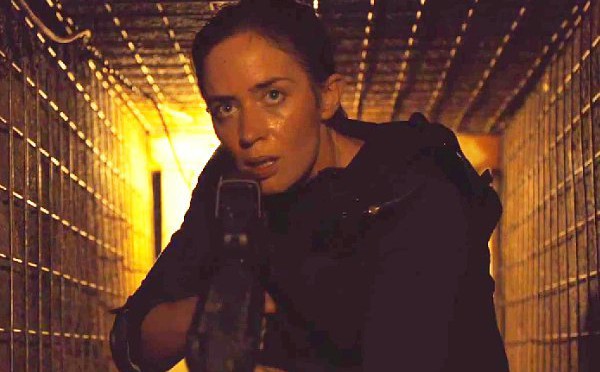In case you didn’t get the grand memo of the twenty-first century, the moral high ground won’t get you very high up the hill of power. This message couldn’t be any clearer than in Denis Villeneuve’s Sicario. As the word is explained in the intro to the film, sicario is the Spanish word for hitman–but, more than that, it was an ancient word used to describe the zealots in Jerusalem who sought out and killed the Roman infiltrators. The two meanings of the term collide in Taylor Sheridan’s debut screenplay with a tough-on-the-exterior FBI Special Weapons and Tactics Teams agent named Kate Macer (Emily Blunt) as the protagonist.
As one of the only concrete sources of good in the narrative, we as the audience feel the same pangs of confusion and remorse as Kate when we see things we can’t or don’t want to fathom. From the very beginning, we’re exposed to the daily trauma of Macer’s profession after a kidnapping raid at a house in Chandler, Arizona, during which the gruesome sight of wall-to-wall bodies murdered at the hands of cartel boss Manuel Diaz (Bernardo P. Saracino) results in an explosion that kills two officers.
Trembling as she cleans her head wound from the incident, it’s clear that Macer is easily shakable when it comes to matters of morality and being sensitive to the injustice she sees around her. This is precisely why she agrees to “volunteer” to be a part of a team being put together by Department of Defense advisor Matt Graver (Josh Brolin). Not told the specifics of the “operation” other than accompanying Graver to El Paso, Macer is rudely awakened when the trip to El Paso turns into a private jet flight to Juarez with a dubious character named Alejandro Gillick (Benicio Del Toro) joining them for the journey.
As they enter a training facility to get briefed on the project, it becomes increasingly clear to Macer that nothing is at all what it seems. Soon, she’s driving with the others through Juarez, seeing such unwanted sights as three people strung up and mutilated for the entire town to see. One of the operatives in the front seat notes of the cartel, “It’s brilliant what they do,” in that they’ll set an example of anyone just to lead the Mexican people to believe that those harmed actually did something to anger the bosses.
After kidnapping Guillermo Diaz, the brother of Manuel, the caravan of cars gets stuck at the border and spots a number of men in separate cars packing heat and ready to shoot in order take back Guillermo, who they’ve removed from prison to torture information out of him regarding the location of an underground tunnel. In one of the most prolonged and intense scenes of the film, a shootout occurs amid the stranded traffic waiting to get back to the United States. Macer stays in the car, reluctant to engage, but forced to when an attacker comes up behind her. In many ways, this is the crux of Macer’s moral dilemma for the entirety narrative. She does not want to do the things Matt and Alejandro expect of her, but is consistently trapped into doing them.
As more and more of the truth unravels, she starts to lose her faith in the system, which she once believed to hold integrity. Now, she’s taken up smoking again (a likable character flaw well-used on Sheridan’s part) and only trusts her partner from the agency, Reggie (Daniel Kaluuya). With a consistent sense of anxiety being built up by the film’s score, as well as the protracted overhead shots of each landscape, Villeneuve keeps us in a perpetual state of panic–very much mimicking the kind felt by Macer.
When Macer learns the final truth from Alejandro at the end, she is, once again, forced to perform a task she can’t bear to. Alejandro scoffs at her and remarks, “You better move to a small town where there are still laws. You’re not a wolf. And this is a land of wolves now.” Sicario offers no consolation about the state of the world or the rogue laws of the drug distributing industry. In this manner, it is even more jaded than 2000’s Traffic. And you have to respect it for that.






















[…] where he finds himself in the role of contract killer, or as it is referred to more reverently, sicario. As his employer notes, “‘Contract killing is the oldest profession the world knows. It […]
[…] than Texan) and written by Taylor Sheridan (following up a solid feature debut in the form of Sicario), Hell or High Water is the modern Western/bank robbery movie you didn’t know you needed. As […]